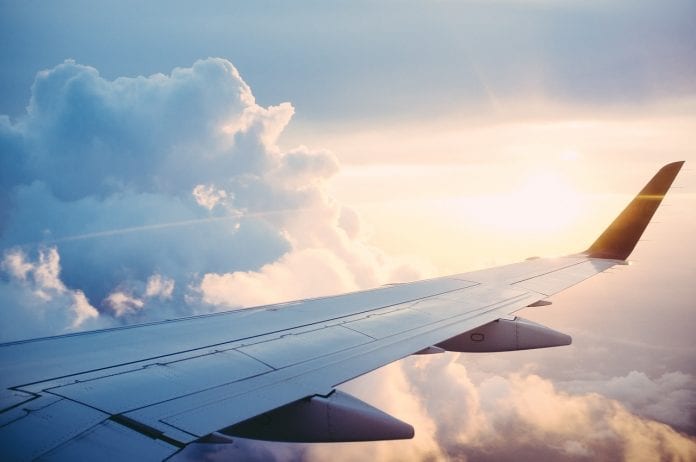Sonia and I firmly believe that by challenging our bad habits, and by making small but positive changes to our routine we can help ourselves and others improve health and well being. One of the most recent changes we have both tried to make is to our travel habits.
Traveling extensively for work may seem like a welcome break from the office, school run, and daily grind but the reality is often different.
When I first started traveling for work, the thought of 7-10 hours of uninterrupted time on a plane to organize myself, and quite frankly have a bit of time out, was incredibly enticing. However, the reality never lived up to the expectation.
I found that the actual reality consisted of jet lag, unhealthy eating, lack of routine, lack of exercise, late nights and an often grueling work schedule. Having gone through it a few times, I was determined to change my mindset and travel habits by tackling the three main problems I faced:
• Jet lag and sleep disturbances
• Nutrition and well-being
• Exercise
• Sleep and jet lag
I firmly believe that sleep is one of the most essential and yet undervalued aspects of modern health. If you are away for business, you need to be on point when you land so the first thing to think about before you embark on your journey is how to tackle jet lag.
Start planning early: Think about the time zone difference at your destination and the number of days you will need to be away. If you are only away for a few days it may be easier to try and stick to your home time zone before and while you are away. If you are away for an extended stay, work and to start adjusting your sleep times a few days before you fly to be more in line with your end destination.
On the plane stay hydrated, avoid alcohol, avoid caffeine and eat lean. Sleep and food are closely related; eating at the wrong time, eating large meals, consuming caffeine and eating rich foods can have detrimental effects on your sleep cycle.
When you arrive at your destination try and slot into the local time zone. If it’s daylight, take a walk outside. Exposure to sunlight helps regulate our internal clock aka our circadian rhythm which regulates our metabolism and sleep cycle. If it’s nighttime try to get at least 4hrs sleep even if you are not tired. (This is referred to as ‘anchor sleep’ and it necessary to reboot your circadian rhythm). Ideally, we need 7-8hrs of sleep a night so if you haven’t slept much at night try then try and take some short naps the following day. (You can only catch up on lost sleep within a 24hr time period but weekend ‘catch-ups’ don’t seem to work).
Try a melatonin supplement: Many research papers have shown that melatonin doses as low as 0.3mg can be useful in helping to tackle jet lag, particularly across 3 or more time zones. Melatonin is a hormone produced in response to darkness, and its release corresponds with the onset of sleepiness. For me, the OneSecond Supplements Daily Sleep Aid spray works incredibly well because it contains a low but optimum dose of melatonin which can be easily customized to each of our individual dosage needs. By adjusting the number of sprays you take, you can tailor the dose to your requirements and avoid the hang over effect found with other products. Because the OneSecond Supplements bottles are small (about the size of a chapstick) I can easily take them with me in my hand luggage even if I’m only traveling with carry-on luggage.
Hydration: Drink plenty of water on your flight and upon your arrival. Dehydration can lead to all sorts of problems including lack of focus, headaches, stomach complaints and poor sleep patterns. Not exactly helpful when you need to have your game face on for work.
Eat lean: A combination of being out of our normal routine and at the mercy of restaurants and room service means that a clean diet often goes out of the window while we are away. Complex carbohydrates, refined sugars, and fast or heavy foods tend to be more readily available and more comfortable to eat when you are on the go or have business meetings at meal times. Combined with jet lag and dehydration this can leave you feeling lousy with sugar spikes and crashes. As enticing as it may be, try not to indulge while you are away, keep highly refined/complex carbs to a minimum, eat plenty of fruit, vegetables, and lean protein.
If we eat well while we travel do we need to take extra vitamins? The answer is probably no, but there are two supplements I ensure I take, especially when I travel for work. These are OneSecond Supplements Daily Vitamin D3 and OneSecond Supplements Daily Immune Support. It’s notoriously difficult to get the adequate levels of vitamin D from diet alone and staying in doors in meetings all day means you lack exposure to the sunlight and UVB radiation that is necessary to produce vitamin D in your body. The importance of vitamin D to our overall health is widely documented. Amongst other things, having the right levels of vitamin D is essential for a healthy immune system and also helps maintain good energy levels.
Caffeine: Caffeine is a great way to improve alertness and focus and can help provide the ‘pick me up’ you sometimes need to get through a day of meetings. One thing I would advise though is that you time any caffeine intake carefully. Caffeine is a stimulant and has a half-life of 5 hours which means that it takes approximately 10 hours for your body to clear it fully from your system. So, on average, the caffeine you take at noon may not be completely cleared from your system until 10 p.m. That’s great if you are traveling east to west and need help staying up a bit later but if you are traveling west to east, with ‘reverse jet lag’ it may hinder your ability to sleep at a decent hour even more. Of course, we all have different sensitivities to caffeine but even low levels in your body at night can disrupt your sleep patterns.
Exercise: Make sure you plan your exercise before and during your trip. Studies show that exercising at the same time each day can help reduce the effects of jet lag. Essentially the circadian rhythm we referred to earlier is controlled by a part of your brain called the hypothalamus. The hypothalamus sends out signals to other parts of your body helping to manage the daily functioning of your body systems including your sleep cycle. Although exercise does not seem to have any effect on your brain’s central clock, a scheduled workout does seem to affect the molecular clock in your peripheral systems like your muscles and lungs. This can help your body adjust to a new time zone more easily.
The study referenced referred ”to scheduled exercise” i.e., Exercise at the same time each day. Ideally, start your exercise routine before you travel and continue the habit while you are away.
Exercising in the morning, especially going for a run outdoors, is excellent as you get exposure to natural daylight which again helps reset the body clock. Remember exercise increases alertness so try to keep exercise routines to the morning rather than the evening before bed, especially if you are suffering from jet lag.
At the end of the day, many of us cannot choose our work travel schedules. However, I would urge everyone to reflect on their own travel habits and try to see how to minimize the negative impact of being a frequent flyer. Awareness of the factors that may be having a detrimental effect on your health and making smart choices to improve your wellbeing will be of benefit in the short and long term.
The OneSecond Supplements Daily Immune Support supplement speaks for itself as it’s designed to help support a healthy immune system. Extensive periods of travel can take their toll so I like to do everything I can to keep fighting fit while I’m away. The central concept behind OneSecond Supplements continues to be empowerment.















